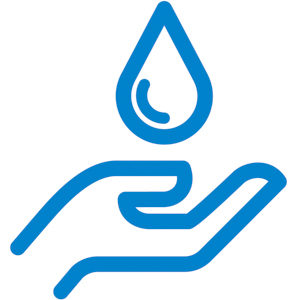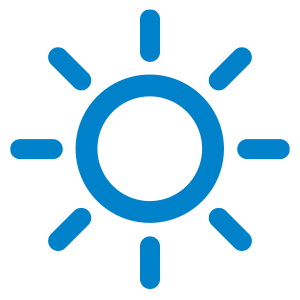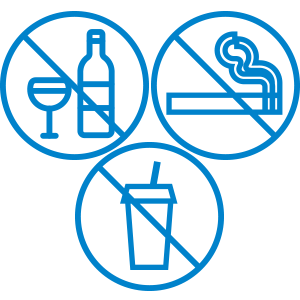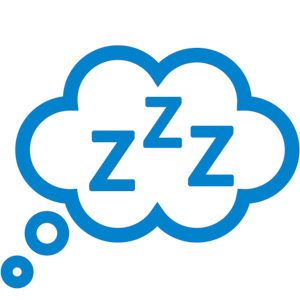Lung Cancer Treatment Side Effects
Side effects of radiation therapy for lung cancer
You will be receiving radiation therapy treatments to the chest wall. Some of the possible side effects that you may experience can include: skin irritation and fatigue. Measures that you can take to minimize these side effects are listed below:
-

Skin Care
It is okay to bathe or shower daily with a mild soap. Wash the treatment area gently. Do not scrub the skin. (If you have ink marks on your skin, please do not wash them off.) Gently pat the skin dry.
During the course of your radiation therapy treatments, we ask that you put nothing on the skin in the treatment area except for the products recommended by the physician or nurse. Use moisturizers for dryness and over the counter hydrocortisone cream for itch. Apply products twice daily or as needed. We do not want the skin “greasy” when you come in for treatment. Underarm deodorant without aluminum may be used.
Avoid the use of hot or cold in the treatment area. This includes the use of heating pads, hot packs, hot water bottles, ice packs and ice bags. It is okay to use an electric blanket. Avoid the use of tape or Band-Aids in the treatment area.
-

Sun Exposure
During treatment, avoid exposing the skin in the treatment area to direct sunlight or tanning beds. If you plan on being in the sun for an extended period of time, cover the skin with clothing or broad-spectrum sunscreen with an SPF of 15 or greater. Once radiation treatments are completed the skin in the treatment area will always be more sensitive to the sun and tanning beds.
-

Esophagitis
Toward the end of therapy, you may notice some irritation of the esophagus (esophagitis). You may notice a sore throat, a lump in the throat, difficulty swallowing or a burning sensation (like heartburn). Please let your doctor or nurse know if you experience any of these symptoms. They can recommend the use of certain products to relieve these feelings.
It is best to avoid these situations:
- It is very important that you avoid alcohol (beer, wine, mixed drinks) and products that contain alcohol (cough syrups, Nyquil).
- Do not use any tobacco (cigarettes, cigars, pipe or chewing tobacco) during treatment. Breathing air that has tobacco smoke or pollutants will irritate your lungs and throat.
- Carbonated beverages, spicy foods, crunchy foods, extremely hot or extremely cold foods, and acidic foods (tomato sauce, citrus fruits, coffee) should be avoided as well.
-

Fatigue
Loss of energy is a common side effect of radiation therapy. Endurance, stamina, concentration, and motivation may all be decreased as a result of fatigue. Conserve your energy and rest when you need to. Eat a well-balanced diet and stay well-hydrated by drinking plenty of water. Exercise such as walking or yoga can improve your energy. Respect your body’s limitations – if you hurt while exercising, stop.
-

Nutrition
It is important to eat well during radiation to aid the body in recovery and restore strength. We suggest a diet high in protein and healthy fats, and use of nutritional supplements such as Boost or Ensure or a similar generic product. Even if you are overweight, we recommend maintaining your weight and preventing weight loss during treatment. You may need to eat small meals or snacks every 2-3 hours rather than eating large meals. It is not unusual to have a decreased appetite during treatment, but you will need to focus on getting enough food daily. Meeting with a dietician is helpful. If you need a referral, let your nurse know.
-

Duration
Side effects may worsen the final week of treatment and the week after radiation treatments are completed. Most of these side effects gradually subside within 4-8 weeks after treatment. Please call our office if you have any questions at any time during or after your radiation treatments.
Managing long-term side effects of radiation therapy for lung cancer
Long-term side effects may also occur following radiation therapy. Since some of these may not begin for weeks – or even years – after your treatments are completed, it’s important to be aware of these and talk to your doctor if you have any symptoms.
- Radiation pneumonitis is an inflammatory response of the lungs, which can occur soon after the completion of radiation treatments. Symptoms include a fever, dry cough, and shortness of breath. Often a short course of steroids is effective and most of the time the condition resolves quickly.
- Pulmonary fibrosis is the formation of scar tissue in the lungs. Symptoms include shortness of breath and a decreased ability to exercise.
- Risk of secondary tumors to damaged genes in normal cells. There is a very small risk of developing a second cancer in an area that received radiation.
Radiation therapy in your chest can affect your heart in several different ways, most commonly in damage to the heart muscle if the targeted region is nearby. Radiation therapy can also increase your risk of coronary artery disease, valve disease, or abnormal heart rhythms.
For questions to ask your provider, see our FAQ page.